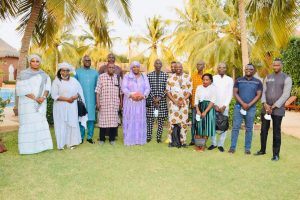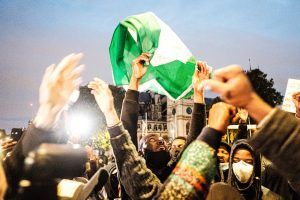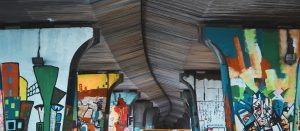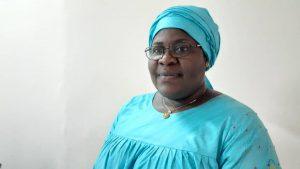Faces of Open Government: Fatou Jagne Senghore
Rostros del gobierno abierto: Fatou Jagne Senghore
Fatou Jagne Senghore is the Director for Article 19, West Africa. As the open government community observed Open Gov Week and World Press Freedom Day this month, Fatou reflects on the need to defend and enhance spaces for civil society organizations, activists, journalists and everyday citizens to express themselves freely, to organize in groups for a common purpose, and to gather together to make their voices heard.
Ambitious plans have been announced by governments in the region in response to the COVID-19 crisis. But some of these have been accompanied by shrinking civil liberties – exacerbating already existing civic space challenges in some of our countries. As a human rightsAn essential part of open government includes protecting the sacred freedoms and rights of all citizens, including the most vulnerable groups, and holding those who violate human rights accountable. T... and freedom of expressionJournalists and activists are critical intermediaries connecting public officials with citizens and serving as government watchdogs, and their rights and safety need to be protected. Technical specifi... More advocate – what should countries, and civil society organizations in particular, be doing over the next two to three years to improve civic space in the region?
Indeed, we have seen significant setbacks on civic space in West Africa over the past few years, including attacks on human rights defenders, political opponents and the media. We have even seen this in countries traditionally known for their history of democracy and for their relative respect for human rights, particularly on freedom of the press.
There is more and more intolerance and repression of dissident voices despite commitments from the governments to adhere to democratic values and respect for human rights through their OGP commitments and action plans. These contradictions are of great concern and if not addressed, this will hinder the progress and the efforts made so far by all actors to entrench good governance and openness in public life. We need to reverse this pattern by working together to create trusted multi-stakeholder platforms at the national and regional levels that can help build genuine consensus on electoral matters, term limits, succession in power, management of natural resources, migration, border security, and building independent and sustainable public institutions. These are some of the issues that actors in many countries are advocating for.
We have also seen an increase in assaults on civil society organizations (CSOs) as more countries use cybersecurity laws and other criminal provisions to intimidate CSOs while others have tried to discredit CSOs – particularly human rights organizations – by calling them unpatriotic. Specific measures should be taken to strengthen judicial and regulatory institutions that have been weakened and are perceived in many countries as non-independent.

Credit PlaceholderPHOTO: Credit: Photo by Article 19 West Africa
World Press Freedom Day was May 3, a day observed to raise awareness of the importance of freedom of the press and remind governments of their duty to respect and uphold the right to freedom of expression. Why is it important to have commitments on this topic and how can open gov champions leverage OGP efforts and that of partners to protect civic space?
The theme for the 2021 World Press Freedom Day was “Information as a Public Good”. This theme provides an opportunity to further assess the situation of the media in terms of the legal and financial obstacles that limit its work. But importantly, it gave us the chance to reflect on the role and responsibility of the media as a key provider of information to citizens in these critical times of governance crisis.
Open government champions should work in tandem to create an enabling environment for media to be free from undue interference and harassment. Meanwhile, governments should provide the legal and regulatory frameworks for independent media to prosper and be sustainable. Leveraging on existing initiatives at the international (UNESCO) and regional levels (African Union/ African Commission on Human and Peoples’ Rights) to support security of journalists and media works and the fights against impunity and mobilization for better access to information and media accountability could help protect civic space.
Open Gov Week was on May 17-21, an opportunity for reformers in government and civil society to co-create commitments to rebuild democracies in a post COVID-19 world. What are some of the areas you think these reformers should focus on to ensure an open response and open recovery to the pandemic?
To rebuild back post COVID-19, reformers need to reaffirm their commitments to openness and accountability and practice it on a daily basis and be more responsive to the needs of citizens. It is critical that public policies in a post COVID-19 world are built in consultation with the constituencies they intend to target/affect in order to reflect their views, needs and aspirations and ensure their smooth implementation. Post COVID-19 will be challenging on many fronts, so it will be important to include everyone in the process and for governments to demonstrate a stronger political will, lift the restrictions on civic space, strengthen the accountability and anti-corruption mechanisms and develop open door policies and improve efficiency of public service delivery through inclusive and participatory approaches. Key to this is unfettered access to information for all and ensuring the independence of the media and CSOs.
Fatou Senghore es la directora de Artículo 19 para el oeste de África. La comunidad de gobierno abierto celebró la semana del gobierno abierto y el día mundial de la libertad de prensa este mes y, en ese contexto, Fatou nos presenta sus reflexiones sobre la necesidad de defender y fortalecer espacios que las organizaciones de la sociedad civil, activistas, periodistas y la ciudadanía en general pueden utilizar para expresarse libremente, organizarse para un fin común y reunirse para hacer que sus voces se escuchen.
Los gobiernos de la región están anunciando la creación de planes ambiciosos para responder a la crisis del COVID-19, pero algunos de estos planes se han desarrollado en contextos de restricción de las libertades cívicas, exacerbando los retos asociados al espacio cívico que ya existían en algunos de nuestros países. Como defensora de los derechos humanos y de la libertad de expresión, ¿Qué crees que deben hacer los países y las organizaciones de la sociedad civil en los próximos dos a tres años para mejorar el espacio cívico de la región?
Ciertamente el espacio cívico se ha debilitado en los últimos años en el oeste de África, lo que se ha reflejado en ataques a los defensores de los derechos humanos, a opositores políticos y a los medios. Esto ha ocurrido incluso en países que tradicionalmente han sido conocidos por su democracia y por su relativo respeto a los derechos humanos, en especial a la libertad de prensa.
Cada vez hay más intolerancia y represión a las voces disidentes a pesar de los compromisos establecidos por los gobiernos de adherirse a los valores democráticos y respetar los derechos humanos a través de sus compromisos y planes de acción de OGP. Estas contradicciones son muy preocupantes y si no se atienden podrían debilitar los esfuerzos que muchos actores han realizado para consolidar la gobernanza y la apertura en la vida pública. Tenemos que revertir esta tendencia, trabajando juntos en crear plataformas multiactor confiables a nivel nacional y regional para establecer verdaderos consensos en temas como las elecciones, límites a los periodos de gobierno, sucesión del poder, manejo de los recursos naturales, migración, seguridad de las fronteras y creación de instituciones publicas independientes y sostenibles. Estos son algunos de los temas que los actores de muchos países están impulsando.
Además, cada vez se registran más ataques a las organizaciones de la sociedad civil (OSC), ya que los países están empezando a utilizar leyes de ciberseguridad y otras disposiciones para intimidarlas, mientras que otras han intentado desacreditarlas, especialmente a las que defienden los derechos humanos. Es necesario tomar medidas para fortalecer las instituciones judiciales y regulatorias que se han debilitado y que en muchos países se perciben como no independientes.
El 3 de mayo fue el día mundial de la libertad de prensa, día que se celebra para sensibilizar a la población sobre la importancia de la libertad de prensa y recordar a los gobiernos su responsabilidad de respetar el derecho a la libertad de expresión. ¿Por qué es importante crear compromisos sobre este tema y cómo pueden los líderes de gobierno abierto aprovechar los esfuerzos de OGP y de sus socios para proteger el espacio cívico?
El tema del día mundial de la libertad de prensa de 2021 fue “la libertad como bien público”. Este tema representa una oportunidad para seguir evaluando la situación de los medios en términos de los obstáculos legales y financieros que limitan su trabajo. Además nos dio la oportunidad de reflexionar sobre el papel y la responsabilidad de los medios como una fuente de información para la ciudadanía en estos tiempos de crisis de la gobernanza.
Los líderes de gobierno abierto deben trabajar en conjunto para crear las condiciones adecuadas para que los medios se encuentren libres de interferencia y acoso. Por su parte, los gobiernos deberán ofrecer los marcos legales y regulatorios que permitan a los medios independientes desarrollarse y ser sostenibles. Las iniciativas internacionales (UNESCO) y regionales (Unión Africana/Comisión Africana sobre los Derechos Humanos y de los Pueblos) podrán apoyar la seguridad de los periodistas y los medios y la lucha contra la impunidad y la movilización para promover un mejor acceso a la información y rendición de cuentas de los medios, ayudando a proteger el espacio cívico.
La semana de gobierno abierto se lleva a cabo del 17 al 21 de mayo como una oportunidad que los reformadores de gobierno y la sociedad civil pueden aprovechar para cocrear compromisos para reconstruir a las democracias en el mundo post COVID-19. ¿En qué áreas crees que deben enfocarse los reformadores para asegurar que la respuesta y recuperación frente a la pandemia sean abiertas?
Para reconstruir las sociedades tras el COVID-19, los reformadores deben reafirmar su compromiso con la apertura y la rendición de cuentas y practicarlas todos los días, enfocándose en las necesidades de la ciudadanía. Las políticas públicas del mundo post COVID-19 deberán diseñarse bajo consultas con la ciudadanía que afectarán y reflejar sus opiniones, necesidades y aspiraciones y asegurar que la implementación ocurra de forma adecuada. El mundo post COVID-19 plantea muchos retos, por lo que será importante incluir a todas las personas en el proceso y que los gobiernos demuestren tener voluntad política, levantar las restricciones al espacio cívico, fortalecer los mecanismos de rendición de cuentas y de lucha contra la corrupción, desarrollar políticas abiertas y mejorar la eficiencia de los servicios públicos a través de estrategias incluyentes y participativas. El acceso a la información para todos y la independencia de los medios y las OSC serán elementos fundamentales de este proceso.
No comments yet
Related Content
 Challenges and Solutions
Challenges and Solutions
Defending Civic Space: How OGP Can Step Up
There is a major opportunity in 2021 to advance civic space reforms in OGP that go to the heart of some of the democratic backsliding the world has seen in…

A Guide to Open Government and the Coronavirus: Civic Space
Governments are taking exceptional steps in response to COVID-19, such as enforcing social distancing and quarantine measures. Prohibitions against in-person gatherings have had a dramatic impact on civic space across…
 Challenges and Solutions
Challenges and Solutions
Civic Space as a Key Prerequisite of Open Government Reforms in the MENA Region
Since joining OGP, Jordan, Morocco and Tunisia have made over 129 commitments. These have included strong commitments on improving access to public information and open data, but when it comes…


Leave a Reply